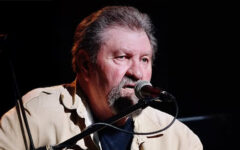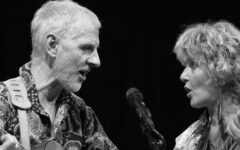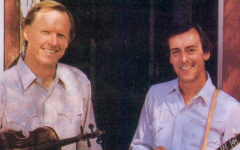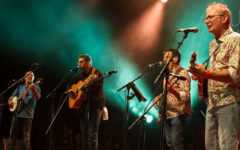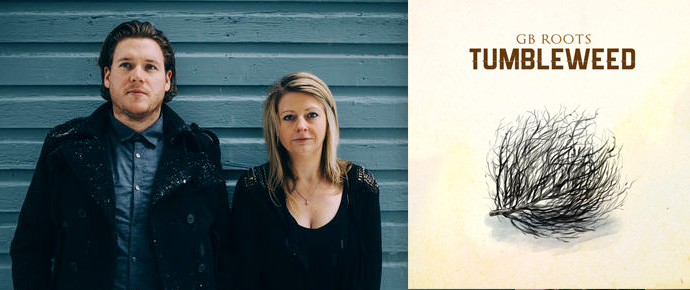
One would think that due to our close proximity to our neighbors to the north, grassicana and bluegrass would exert as strong an influence on Canadian music as found on this side of the divide. Nevertheless, that doesn’t always appear to be the case, especially in the western provinces where live bluegrass seems to be in short supply.
“Unfortunately, the area I grew up in wasn’t as rich in bluegrass as some areas are in the United States,” David Barber, guitarist, banjo player and vocalist for the Canadian grassicana band GB Roots relates. “Luckily I found some like-minded people that allowed us to put some bands together and perform locally. That was just as the O Brother Where Art Thou soundtrack took off, so that helped keep us gigging in the areas around home. Fiddle music was a little bit more popular than bluegrass, so it was also good to learn to play all the old time fiddle music.”
Barber and his wife Kirby Green were brought together by their common love of the genre, but as Barber admits, his wife’s interest in the form was also hampered by its lack of popularity in the places where she was raised as well. Nevertheless, she played both upright and electric bass in the school jazz band and later began dabbling in songwriting. “After we met in music school, we started playing in country bands,” Barber explains. “There was a pretty thriving bar/honky tonk scene happening there, and we were lucky enough to start playing in a lot of the local bands and eventually we started traveling around the country doing it. We were able to perform with a lot of artists that were doing quite well in the Canadian music scene and that gave us a lot of experience.”
Not surprisingly, Barber’s initial exposure to bluegrass came about in the usual way…by seeing it performed on television.
“The first time I heard bluegrass was when my parents put on some video cassettes of The Beverly Hillbillies and The Andy Griffith Show, he recalls. “That was when I first heard Earl Scruggs and Doug Dillard, and from that point on, I really wanted to play the banjo. My parents weren’t sure they wanted to invest in a banjo for me on a whim, so they suggested I play an old Harmony guitar that was lying around to see if I would keep it up. I continued working at playing guitar, and eventually saved up for my first banjo. Once I got a banjo, I was completely hooked. So I can safely say that if it wasn’t for bluegrass, I wouldn’t be playing music.“
For Barber, that was just the beginning of his journey. “Listening to Earl Scruggs led to Bill Monroe, Ricky Skaggs, Tony Rice, Béla Fleck, and Bryan Sutton, to name but a few. There was just something so honest about bluegrass music. There’s no hiding behind anything in that genre, and in the early 2000s, the music on the radio wasn’t really exciting me the way bluegrass was. I felt like I may have been born in the wrong time period!”
Barber eventually went on to further pursue music by taking music studies in college, which is where he met his future wife, singer and bassist. “I actually met Kirby’s brother first who was also studying music, and got him hooked on the band Nickel Creek,” Barber remembers. He also told Kirby about that band and got her interested in it as well. “Kirby started getting into bluegrass music around that time, and really got into bands like Nickel Creek and Alison Krauss and Union Station.”
They dubbed their outfit GB Roots, deriving the name partially from the pairing of the first letters of each of their last names. “We felt like we both came from fairly different musical backgrounds, so we liked how the name points to our different musical roots and shows up in our sound.”
GB Roots is known for an expansive approach that also incorporates elements of blues and jazz. In addition, the two also perform with a bluegrass band called The High Bar Gang (named after an area in British Columbia), which, Barber says helps fulfil their need to tap into the traditional. The latter group was nominated for a Juno award, Canada’s equivalent of the Grammy. Meanwhile, GB Roots’ debut album The Key, garnered them a nomination for a Western Canada Music Award. In addition, the two have also been recipients of several individual instrumentalist awards as well.
Barber’s affection for grassicana and its key ingredients, bluegrass and Americana, remains an inherent part of GB Roots’ musical makeup, even when pushing at its parameters. “Bluegrass music’s core is very much folk songs and fiddle music, which really goes back a long way in history,” he explains. “Although bluegrass has really moved far beyond folk songs, at its core, the chord progressions are very much ingrained in the folk songs that were handed down through time. It’s very interesting how fiddle music/folk songs can be ever so slightly different when you travel around North America. A popular fiddle song like St. Anne’s Reel can be drastically different all over the country. Bluegrass/folk/fiddle music has become the people’s music, and it represents where someone is from in the way you grew up hearing the melody played.”
That evolution continues to be reflected in the band’s own music. “Our current album (Tumbleweed) is pretty focused in it’s theme and vibe,” he suggests. “We didn’t really have a specific direction when we started writing for this album, but once we wrote a couple songs that had a ‘wild west’ influence, we really got excited and headed in that direction. We are also happy with the variety in styles, as we feel the songs all have a different flair to them but the subject matter tied it all together.”
As for the future, the pair expect their next full length effort will find them emphasizing their core sound. “We expect the next album to go in a more acoustic direction,” Barber notes. “So that should really give us room to bring out more bluegrass and Americana roots.”

